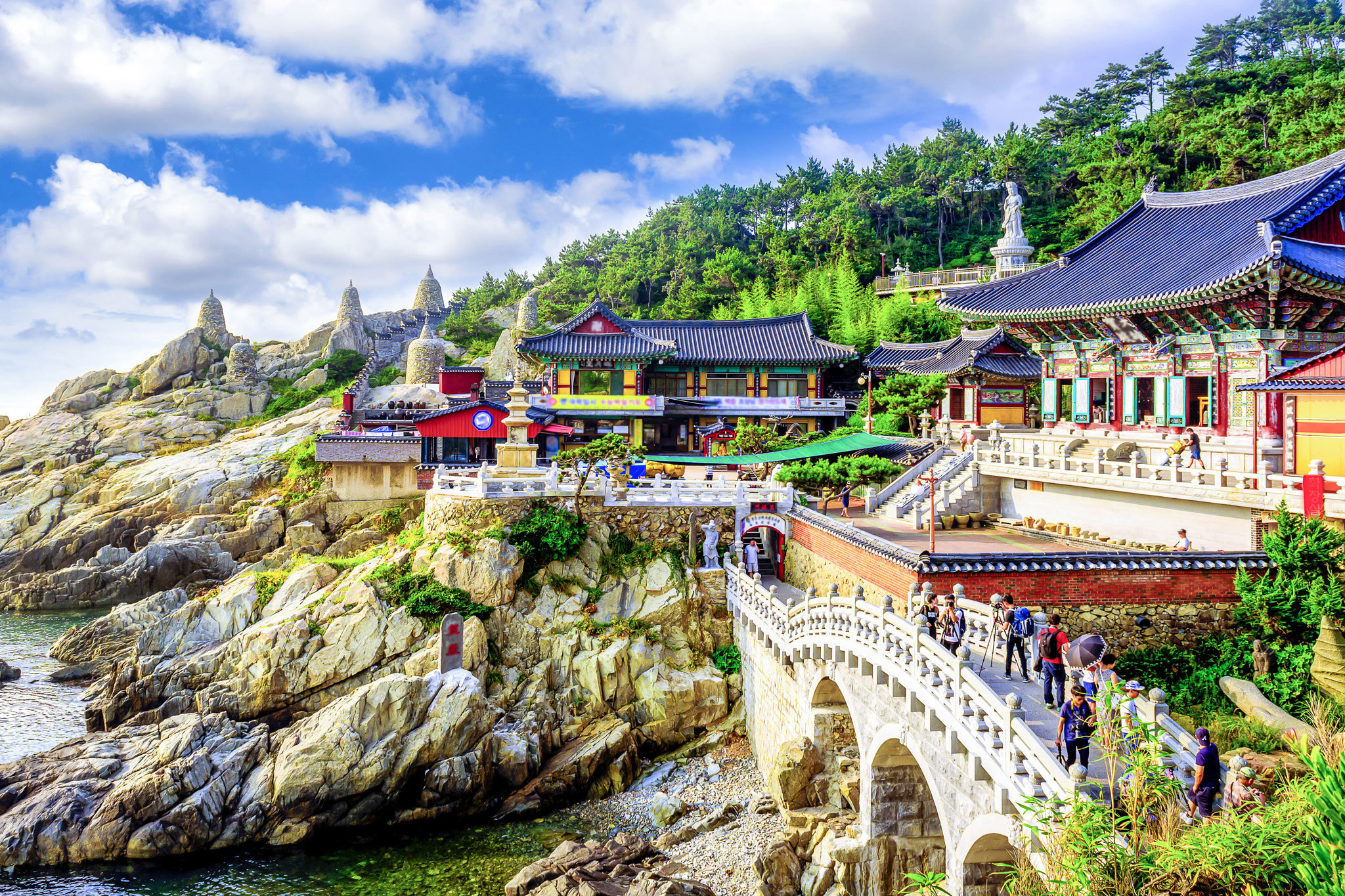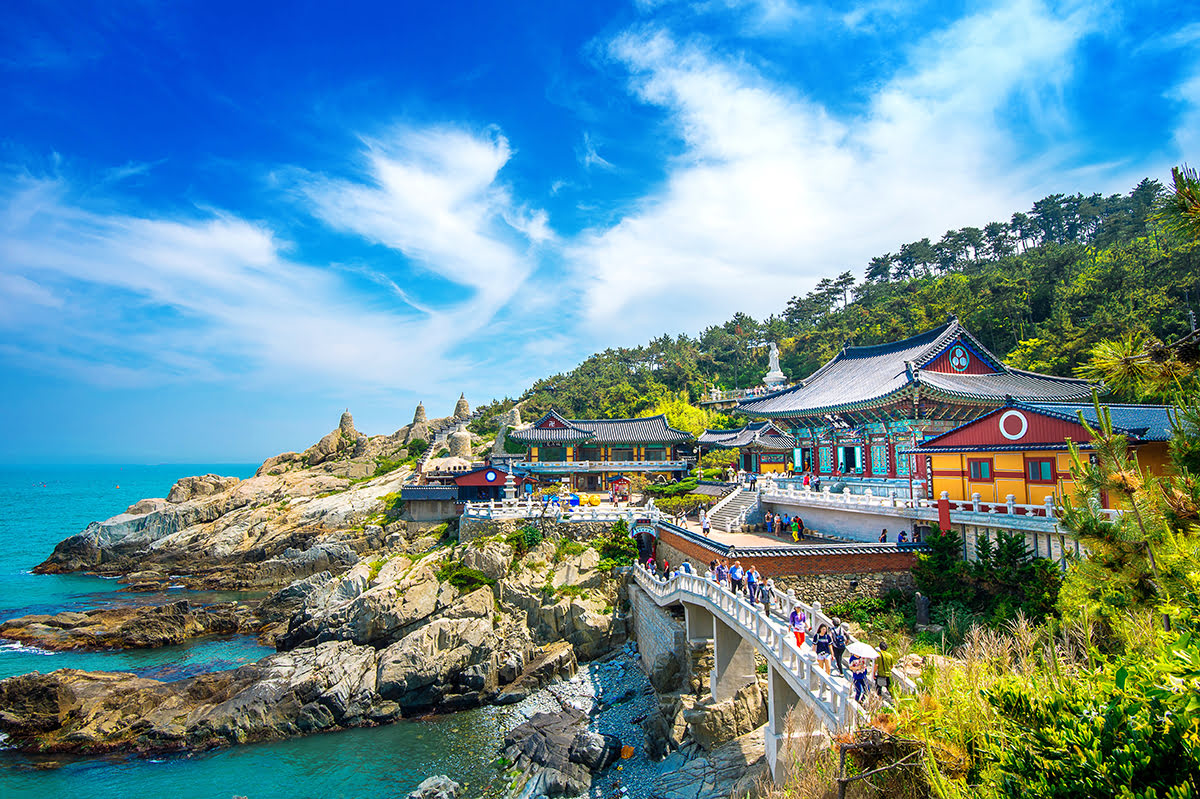
Busan, South Korea’s second-largest city, is a vibrant tapestry woven with the threads of ancient history, modern dynamism, and breathtaking natural beauty. Nestled on the southeastern coast, it’s a city that pulsates with the rhythm of the sea, offering a captivating blend of bustling city life, serene beaches, and cultural immersion. From the colorful houses clinging to hillsides to the aromatic spice markets and the shimmering skyscrapers, Busan promises an unforgettable experience for every traveler.
This comprehensive guide will equip you with everything you need to plan your perfect Busan adventure, from its iconic attractions and rich history to practical travel tips, accommodation choices, transportation networks, and the optimal times to visit.
A Glimpse into Busan’s Storied Past

Related Articles about Busan: Where the Mountains Meet the Sea – A Comprehensive Guide to South Korea’s Coastal Gem:
- Lombok: A Traveler’s Guide to Paradise Found
- Unveiling the Heart of Spain: A Comprehensive Travel Guide to Madrid
- Kazakhstan: A Traveler’s Guide to the Land of Steppe and Sky
- A Comprehensive Traveler’s Guide to the United Kingdom: From Ancient Stones to Modern Marvels
- Iceland: A Land of Fire and Ice – Your Ultimate Guide to Adventure
Busan’s history is deeply intertwined with its strategic coastal location. For centuries, it served as a vital port city, facilitating trade and cultural exchange. During the Joseon Dynasty (1392-1897), Busan played a crucial role in maritime trade with Japan.
The city experienced significant upheaval during the Korean War (1950-1953). As the capital of South Korea shifted, Busan became a refuge for millions of displaced people. This period left an indelible mark, with the creation of temporary settlements that eventually evolved into vibrant communities, such as the iconic Gamcheon Culture Village. This historical resilience has shaped Busan’s character, fostering a spirit of adaptability and a strong sense of community.
In recent decades, Busan has transformed into a global hub for trade, culture, and tourism. Its burgeoning film festival, the Busan International Film Festival (BIFF), has gained international acclaim, further cementing its status as a cultural powerhouse.
Top Attractions: Busan’s Must-See Marvels
Busan boasts a diverse array of attractions catering to all tastes. Here are some of the absolute must-sees:
-
Gamcheon Culture Village: Prepare to be mesmerized by this "Machu Picchu of Busan." This former slum has been transformed into a vibrant art installation, with colorful houses cascading down the hillside, adorned with whimsical murals and sculptures. Wander through its narrow alleys, discover hidden art studios, and soak in the panoramic views of the city and the sea. It’s a photographer’s paradise and a testament to Busan’s creative spirit.
-
Haeundae Beach: As South Korea’s most famous beach, Haeundae is a summer playground. Stretching for 1.5 kilometers, its golden sands are lined with luxurious hotels, trendy cafes, and seafood restaurants. Whether you’re looking to bask in the sun, take a refreshing dip, or simply enjoy the lively atmosphere, Haeundae is the place to be. Don’t miss the stunning sunset views from Haeundae Blueline Park.
-
Gwangalli Beach & Gwangan Bridge: Adjacent to Haeundae, Gwangalli Beach offers a more laid-back vibe with its charming cafes and restaurants. Its true star, however, is the majestic Gwangan Bridge, which illuminates the night sky with a dazzling light show. Enjoy a romantic stroll along the beach or savor a delicious meal with the bridge as your backdrop.
-
Jagalchi Fish Market: Immerse yourself in the sensory overload of Busan’s largest and most famous seafood market. Witness the bustling activity of vendors hawking their fresh catches, from exotic sea creatures to familiar favorites. You can even pick out your own seafood and have it prepared at one of the many attached restaurants for an authentic Busan culinary experience.
-
Beomeosa Temple: Escape the city’s hustle and bustle at this ancient Buddhist temple, nestled on the slopes of Geumjeongsan Mountain. Founded in 678 AD, Beomeosa is one of Korea’s most significant temples, boasting beautiful architecture, serene gardens, and a peaceful atmosphere. Hike up for stunning views or participate in a temple stay for a truly immersive experience.
-
Taejongdae Park: This natural park offers dramatic coastal cliffs, lush forests, and breathtaking ocean vistas. Explore its winding trails, visit the iconic lighthouse, and take a leisurely stroll to the observatory for panoramic views of the East Sea. The park is accessible by a charming hop-on-hop-off train, making it an easy and enjoyable excursion.
-
Busan Cinema Center: Home to the prestigious BIFF, this architectural marvel is a must-visit for film buffs. Its striking design, featuring the world’s longest cantilevered roof, is an attraction in itself. Catch a screening or explore its exhibition spaces.
-
BIFF Square: Located in the heart of the city, this vibrant area is a testament to Busan’s love for cinema. It’s lined with street food stalls offering delicious Korean snacks, including the famous "BIFF hotteok" (sweet pancake).
-
Songdo Beach & Cable Car: Busan’s first public beach, Songdo, has been revitalized with a skywalk and a scenic cable car. Glide above the turquoise waters for unparalleled views of the coastline and the city.
-
Haedong Yonggungsa Temple: This unique temple is perched precariously on a cliff overlooking the sea, offering a truly spectacular setting. The sound of crashing waves and the scent of incense create a spiritual and serene ambiance.

Practical Travel Tips for a Seamless Busan Experience
- Language: While Korean is the official language, English is spoken in tourist areas, hotels, and major attractions. Learning a few basic Korean phrases will be greatly appreciated.
- Currency: The currency is the South Korean Won (KRW). Credit cards are widely accepted, but it’s advisable to carry some cash for smaller establishments and markets.
- Wi-Fi: Wi-Fi is readily available throughout Busan, in hotels, cafes, and public areas. Consider purchasing a local SIM card or renting a portable Wi-Fi device for constant connectivity.
- Tipping: Tipping is not customary in South Korea.
- Etiquette: Be mindful of local customs. Remove your shoes before entering homes, temples, and some restaurants. When dining, it’s polite to wait for elders to start eating first.
- Safety: Busan is a very safe city with a low crime rate. Exercise common sense and awareness, as you would in any major city.
- Power Outlets: South Korea uses Type C and F power sockets with a voltage of 220V.
Accommodation Options: From Budget to Luxury
Busan offers a wide spectrum of accommodation to suit every budget and travel style:
-
Luxury Hotels: For an indulgent stay, consider hotels in the Haeundae or Gwangalli areas, offering stunning ocean views and world-class amenities. Examples include The Westin Chosun Busan, Park Hyatt Busan, and Lotte Hotel Busan.
-
Mid-Range Hotels: Numerous comfortable and well-equipped hotels can be found throughout the city, particularly in areas like Seomyeon and near major subway stations. These often provide excellent value for money.
-
Boutique Hotels: For a more unique and personalized experience, explore Busan’s growing selection of stylish boutique hotels, often found in trendy neighborhoods.
-
Guesthouses and Hostels: Budget travelers will find a wealth of affordable guesthouses and hostels, especially in popular tourist areas like Haeundae and Nampo-dong. These are great for meeting other travelers.
-
Hanok Stays: For a traditional Korean experience, consider a Hanok stay, where you can sleep on a futon on a heated floor in a beautifully preserved traditional Korean house.
Getting Around Busan: Efficient and Convenient Transportation
Busan boasts an excellent public transportation system, making it easy to navigate the city:
-
Subway: The Busan Subway system is extensive, clean, and efficient, connecting most major attractions and neighborhoods. It’s the most popular and cost-effective way to travel. Purchase a T-Money card for easy tap-and-go payments.
-
Buses: A comprehensive bus network complements the subway, reaching areas not directly served by the metro. Bus routes can be a bit more complex, so using navigation apps is recommended.
-
Taxis: Taxis are readily available and relatively affordable. They are a convenient option for shorter distances or when traveling with luggage. Ensure the meter is running.
-
KTX (Korea Train eXpress): If you’re arriving from other parts of South Korea, the KTX high-speed train is the most efficient way to reach Busan. The main station is Busan Station.
-
Ferries: Busan is a major port city, and ferries connect it to other destinations, including Japan (Fukuoka and Shimonoseki).
-
Walking: Many of Busan’s attractions, especially within specific neighborhoods like Gamcheon or Jagalchi Market, are best explored on foot.
Best Time to Visit Busan: Embracing the Seasons
Busan experiences four distinct seasons, each offering a unique charm:
-
Spring (March to May): This is arguably the most pleasant time to visit. The weather is mild and sunny, with blooming cherry blossoms and other flowers creating a picturesque landscape. It’s perfect for outdoor exploration.
-
Summer (June to August): Summer is hot and humid, with a high chance of rain and typhoons. However, it’s also peak beach season, and the lively atmosphere at Haeundae and Gwangalli is infectious.
-
Autumn (September to November): Similar to spring, autumn offers pleasant temperatures and clear skies. The foliage turns vibrant shades of red and gold, making it a beautiful time for hiking and sightseeing. The BIFF also takes place during this season.
-
Winter (December to February): Winters in Busan are generally mild compared to inland areas, with temperatures rarely dropping below freezing. While it can be chilly, it’s still a good time to visit if you prefer fewer crowds and enjoy seeing the city dressed in festive decorations.
In conclusion, Busan is a city that captivates with its diverse offerings. From the artistic wonder of Gamcheon Culture Village and the iconic beaches of Haeundae to the bustling energy of Jagalchi Market and the serene beauty of its temples, Busan promises an enriching and unforgettable travel experience. With its efficient transportation, comfortable accommodation, and welcoming atmosphere, this coastal gem is ready to steal your heart.





